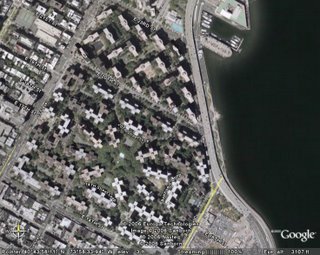
Word from the New York Times that MetLife has sold Stuyvesant Town and Peter Cooper Village for $5.4 Billion. Stuyvesant and Peter Cooper are apartment complexes -- 27 separate buildings with more than 11,000 apartments -- located on the lower east side of Manhattan. I used to live across the street from Stuyvesant.
They are largely middle class and, at least when I lived in the area, largely white. About 75% of the apartments are rent controlled. I assume that MetLife sold out because it didn't want to deal with the grief that's going to come to the owner over the next generation as the development emerges from rent control. From the article:
Daniel R. Garodnick, a city councilman who lives in Peter Cooper Village and helped organize the tenant offer, expressed disappointment in the outcome. Nearly three quarters of the 11,232 apartments have regulated rents that are roughly half the market rents, and tenants fear that a new owner will bring sweeping changes.Again we see that for many people the political impulse is inextricably tied to the delight in being able to tell other people what they have to do with their property. America has a liberal party and a conservative party, but has never had a successful "don't just do something, stand there" party.
"We want to know how the new owner intends to preserve the long-term affordability of Stuyvesant Town and Peter Cooper Village," Mr. Garodnick said. "We expect a new owner to not only to honor his obligations under the law, but to come up with a plan that preserves the long-term affordability of this middle-class community."
Most of the 11,232 apartments in the complexes are now subject to rent regulation. When MetLife announced earlier this year that it was putting the two complexes up for sale, it bridled at suggestions that the company had any continuing obligation to provide below-market housing. Real estate companies leaped at the prospect.
Company executives have suggested to city officials and reporters that many of the 25,000 residents of Peter Cooper Village and Stuyvesant Town made too much money to qualify for any kind of assistance.
In recent years, MetLife has ousted illegal sublettors and tenants whose apartments were not their primary residences. Under city regulations, an apartment can cease to be rent-controlled or rent-stabilized when it becomes vacant, or when the rent reaches $2,000 a month and the existing tenant’s household income rises above $175,000 for two successive years. As a result, about 27 percent of the apartments in the complexes are now leased at market rates. An additional 1,600 units will be freed of rent regulation over the next two years, according to sale documents.
No comments:
Post a Comment